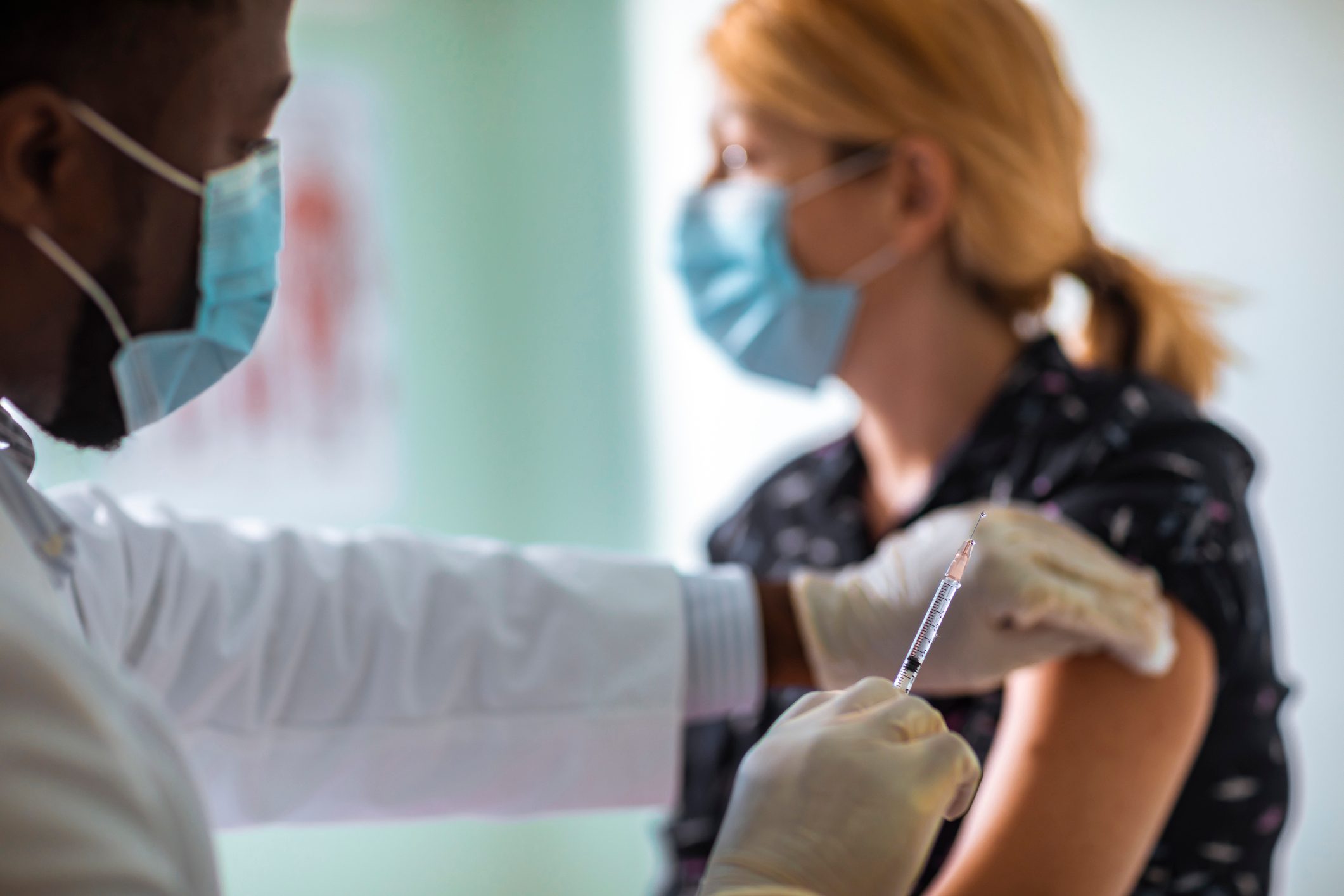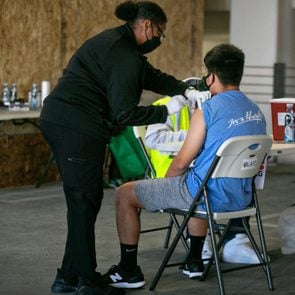6 Reasons Women May Have More Covid-19 Vaccine Side Effects Than Men
Updated: May 12, 2021
Covid-19 vaccine side effects can include fever, chills, and pain at the injection site. Women are reporting more of these side effects than men. Here's why.
Covid-19 vaccinations
As Americans continue to get Covid-19 vaccines, the Centers for Disease Control (CDC) collects and analyzes data on reactions to the injection. The good news is that few serious Covid-19 vaccine side effects have been reported.
An analysis of CDC data collected during the first month of the vaccination rollout, published in Morbidity and Mortality Weekly Report in February, indicates that while most reactions to the shots were not serious, women reported more vaccine side effects than men.
“Women’s bodies are hormonally and genetically different from men’s bodies, and while we know that men and women respond differently to various medical interventions, they have consistently reacted differently to most vaccines,” says Betsy Koickel, MD, a family medicine specialist at Northwell Health in Levittown, New York.
Covid-19 vaccine side effects
Let’s start with the vaccines involved in the Morbidity and Mortality Weekly Report. Because researchers looked at vaccinations during the start of the year, it investigated side effects of only the Pfizer-BioNTech and Moderna vaccines.
Of the nearly 14 million doses administered from December 14, 2020, through January 13, 2021, there were about 7,000 reports of adverse reactions submitted to the CDC by health care providers, vaccine manufacturers, and the public. The median age of those reporting side effects was 42. Women made up 78 percent of those reporting symptoms, though only 61 percent of vaccines were administered to women.
Of all reported side effects, 90 percent were not serious. The most common side effects, which tend to last for a few days, can occur after either the first or second dose of the vaccine. They include soreness and swelling at the injection site, headaches, fatigue, dizziness, chills, and fever. They may not be pleasant, but they’re signs the body is building protection against the virus.
More serious side effects weren’t common. Anaphylactic shock or a serious allergic reaction is rare and usually occurs within seconds or minutes of being vaccinated. (That’s why you need to wait 15 minutes after getting the shot.) And deaths occurred in just 113 of the almost 14 million vaccinated people, two-thirds of whom were elderly people in long-term care facilities. (Just because a death occurs after the shot doesn’t mean that the vaccination was the cause.)
It’s not surprising that people may respond differently to the Covid-19 vaccine. As with previous vaccinations, like the one for the 2009 swine flu pandemic, women were four times more likely than men to report allergic reactions after being vaccinated. In the Vaccine study that reported the findings, men and women were between the ages of 20 and 59, and more men got the shot.
Our experts say the differences in vaccine side effects can be attributed to hormones, genetics, and other factors. Here’s a closer look at six potential reasons women may report more Covid-19 side effects than men.
Women may be more likely to report side effects
All of the data in the study was based off of self-reported data. So one explanation for the gender difference may be that women are more likely to report side effects than men, even if they’re experiencing the same symptoms. Whether or not this is the case remains to be seen and would require further study.
(Find out why women may want to reschedule their mammograms after getting the Covid-19 vaccine.)
Hormones may influence the immune system
Dr. Koickel says the female hormone estrogen generally enhances and influences the reaction of the immune system. The male hormone testosterone, on the other hand, tends to act as an immune suppressant.
An example of sex-based differences in immune response is that women are more commonly diagnosed with autoimmune diseases like lupus and multiple sclerosis, says Daniel Kuritzkes, MD, chief of infectious diseases at Brigham and Women’s Hospital and a professor at Harvard Medical School in Boston. Men don’t get off scot-free, though. They’ve experienced more severe illness and more deaths from Covid-19 than women.
Jonathan Parsons, MD, a critical care physician overseeing a mass vaccination initiative at The Ohio State University Wexner Medical Center in Columbus, points out that most vaccinations at the time of the study’s reporting had been administered to older people.
Most women who had been vaccinated during the first month of vaccine availability were older than 60, which means they were probably post-menopausal. That’s worth considering because the ovaries stop producing female hormones—like estrogen—in menopause.
“Now that younger people are being vaccinated, it will be interesting to see if gender differences are maintained,” says Dr. Parsons.
(Here’s why you don’t have to worry about the Covid-19 vaccine causing infertility.)
Women might have healthier immune systems
There’s a chance women’s immune systems are healthier, leading to more Covid-19 vaccine side effects.
“We’ve observed that side effects are more common in younger people after the second shot,” says Dr. Kuritzkes. “They occur more frequently in younger people who have healthier immune systems.”
Everyone’s immune system works differently, and Dr. Koickel cautions that we can’t draw a direct correlation between side effects and a working immune system. We can, however, indirectly infer that a more-adverse reaction is a sign of a strong immune response.
Of course, researchers would need to conduct studies looking at the immune response of men versus women before and after getting the vaccine to say for sure whether this is a factor.

Women and men are genetically different
Just like hormone differences may account for the disparity in Covid-19 vaccine reactions, so too may genetic differences, says Dr. Koicke. “Immune genes are found more on the X, or female, chromosomes,” she adds.
While Dr. Kuritzkes acknowledges that some genetic predispositions may exist, scientists could make a definitive conclusion only if a very large study group was assembled to test the theory. “So far, we have no concrete evidence of this,” he says.
Vaccine dosage may be too strong
Some experts, including Dr. Koickel, believe it’s possible that the vaccine dosage, which is the same for men and women, is too strong for women—and a reason for more adverse reactions.
But some experts think the dose itself—not the dose relative to your body weight—matters more when it comes to side effects. Dr. Kuritzkes says preliminary studies for all vaccines indicate that higher doses cause more symptoms.
“There is no analysis that looks at the weight or BMI of vaccine recipients,” he says. “And thus we can’t make this conclusion.”
There weren’t separate vaccine trials conducted on men and women, so researchers don’t if a smaller dose would give women the same protection with fewer side effects.
(These are the vaccine facts you should know.)
Reporting bias may account for the sex differences
The analysis of CDC data covers the response to the Covid-19 vaccine during the first month of its rollout. A chance of reporting bias (only selectively looking at information) could distort the analysis and conclusion that women experience more side effects from the shots than men.
Dr. Kuritzkes also points out that the study doesn’t compare vaccines head to head. For example, the side effects of the Moderna shots are not being compared with the side effects of the Pfizer shots, so we don’t know if reactions occur more by brand. If one type of vaccine leads to more side effects than others, and if more women have gotten that vaccine, it may be why more women have side effects.
(Moderna vs. Pfizer Covid-19 vaccines: Here are the differences.)
Covid-19 vaccine side effects can be eased
Experts agree that adverse reactions to vaccination shots usually occur within the first 24 hours. Soreness at the site can be relieved with hot or cold compresses.
For aches, pains, and fever, take acetaminophen (Tylenol). For fever or inflammation, take ibuprofen (Advil or Motrin). Dr. Kuritzkes says these drugs won’t interfere with the vaccine if you take them after symptoms arise, but there is some evidence that taking them before getting the vaccine can suppress the shot’s effectiveness.
Be sure to increase your fluid intake with and without electrolytes, refrain from strenuous activity, and get some sleep. Dr. Parsons says that 95 percent of reactions will resolve themselves within 24 hours. “Nothing can prevent side effects,” he says, “but their severity can be alleviated.”
(Don’t fall for these Covid-19 vaccine myths.)
The last word
Physicians and researchers agree that the Covid-19 vaccines are safe and effective. By getting one, says Dr. Kuritzkes, you’ll not only be protected from Covid-19, but you’ll also be helping to end the pandemic by contributing to herd immunity.
“The value of long-term protection far outweighs the investment of possibly feeling poorly for a day or two,” says Dr. Parsons.
Next, find out if you need the vaccine if you had Covid-19.



